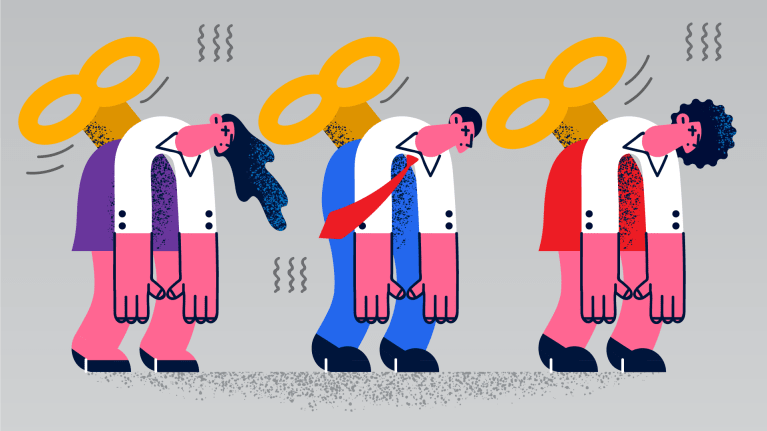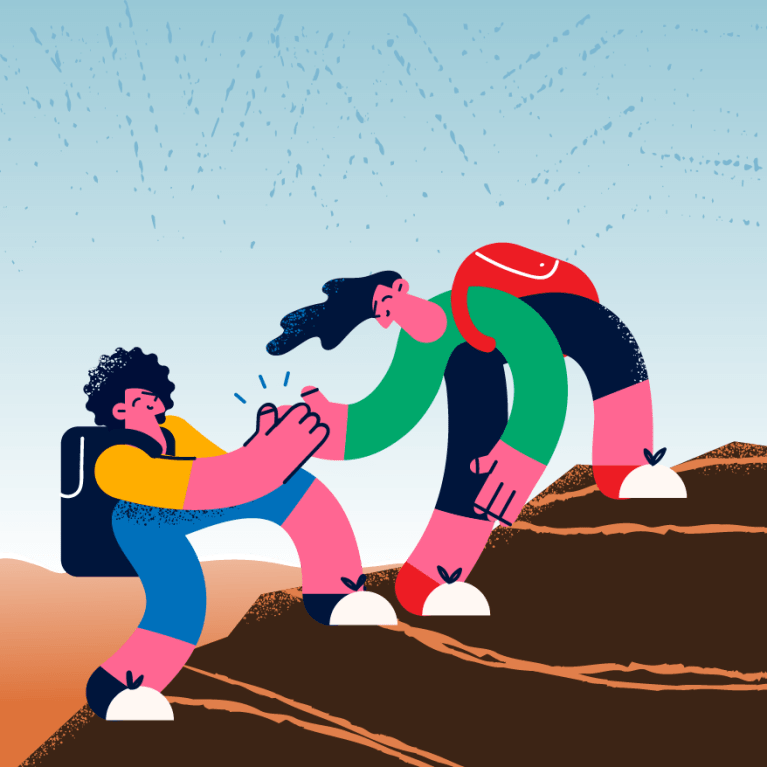
?Feeling a bit frayed around the edges? Energy zapped, emotionally drained, decreased job satisfaction? Burnout is real for HR professionals.
Your work often involves handling workplace complaints and investigations, dealing with multiple generations who expect different things from their employer, recruiting challenges, and the work-from-home/return-to-office tug of war. Then there are the difficult conversations around poor performance, attendance issues, layoffs and terminations.
And that’s the short list.
New SHRM research from its 2023 State of Mental Health & Well-Being in the Workplace Study found many workers are experiencing low energy and exhaustion at the end of the workday, affecting their capacity to participate in activities outside of work.
SHRM Online reached out to learn how HR destresses. These HR professionals’ answers are as varied as the companies where they work. Some find solace in a hobby, going for a run or a walk, or practicing meditation. Others discovered reading, journaling or a digital detox works wonders.
Read on for other ways HR professionals recover from burnout. Responses have been edited for brevity.
 Dance
Dance
Attending ballet classes twice a week helps Felicia Shakiba destress. She is founder and global senior executive HR consultant for CPO Playbook, a global leadership and HR consulting firm in Los Angeles, and has a background in industrial-organizational psychology.
“Ballet is not only a beautiful art form but also a physically demanding and mentally stimulating activity,” she said, noting it provides a combination of artistic expression, physical exercise and mental focus that help her disconnect from work.
“The precision, discipline and coordination required in ballet demand my full attention, which helps me clear my mind and release tension” and enhances her overall well-being. It allows her, she added, “to tap into my artistic side and find inspiration that positively impacts my work and personal life.”
Photography
Andy Flynn, HR director at SpryLyfe Medical, a respiratory medical equipment supplier in Parker, Colo., has a passion for photography.
“Devoting time to this hobby allows me to disconnect from work-related obligations and immerse myself in another universe,” he said. “Finding a hobby that offers you pleasure and helps you unwind can contribute significantly to your recovery from burnout.”
Boxing
Shannon Norman, SHRM-SCP, senior director and people business partner at Avadel Pharmaceuticals in Chesterfield, Mo., finds boxing relaxing.
“[There’s] nothing like punching a bag to relieve stress,” she said.
Norman makes a point to regularly ask herself what she has done lately to recharge her battery.
“If I hadn’t done anything in the last few days, I am committed to doing something in the next 24 hours,” she said. That may include taking a walk, watching a funny show, basking in the sun, talking to a loved one or volunteering.
 Hiking and Camping
Hiking and Camping
Connecting with nature helps Peter Hoopis decompress. The owner and CEO of Peter Hoopis Ventures, a travel and outdoor living company in the Chicago area, is involved in the company’s HR efforts, especially hiring, employee engagement and performance evaluations.
The work “takes quite an emotional toll, so going out in nature helps me take a breather and disconnect from the weight of HR interactions,” he said.
“It helps calm my mind and get grounded. I do this at least once a month,” he said of his sojourns that may include hiking, camping, and spending time in the mountains or near the water. “I feel so recharged after being out in nature and feel almost like a new person when I come back to work!”
Music
“My go-tos for recharging: live music, a walk with a podcast or audio book, or take a dance class,” said Laura Rice, member services manager at Vermont Smoke & Cure, a rural smokehouse in Hinesburg, Vt. She also owns a boutique in Charlotte, Vt.
“Live music feeds my soul. Feeling the beat of the drum, the strum of the guitar or the words that speak to me. It gives me a sense of calm, grounds me and helps me to recharge,” said Rice, who also has discovered a love of dance classes.
“The ability to pair music, movement and building a community of like-minded people helps me recharge.”
Fishing
“You’d often find me indulging in my passion for fishing in the breathtaking waters of the Florida Keys,” said Normand Chevrette, president and CEO of CME Corp. Chevrette also heads the HR operations at the Warwick, R.I.-based company.
“I make it a priority to spend quality time fishing at least twice a month,” which a hybrid work schedule makes possible, he said. “The tranquil environment, the soothing sound of the waves, and the thrill of the catch contribute to my mental and emotional rejuvenation.”
Fishing, he added, fosters a “sense of clarity, enabling me to return with renewed focus and creativity. It’s remarkable how investing time in my passion outside of work directly translates to improved performance within the office, making me a more balanced, productive and inspired professional.”
Tennis
When the pandemic shut down Pat Mulvey’s weekly basketball game, a fellow player got him interested in tennis. Today the director of talent acquisition at Saatva, a New York City-based luxury mattress and home furnishings company, is back on the basketball court and still playing tennis four times a week.
“There is no doubt playing a sport is great physically, but the benefits psychologically are even more significant,” he said. “It reduces stress, you have greater energy, you are more alert and you sleep better,” and the camaraderie of the court community “creates a healthy state of mind.”
 Gardening
Gardening
Puttering in the garden is how Joey Price fights burnout.
Price is CEO of Jumpstart: HR, a small business in Baltimore specializing in HR outsourcing and managed HR services. In 2016 Price was named to HR Magazine’s “30 Under 30” list of HR rock stars.
“Ever since the pandemic, I’ve grown a small garden plot of carrots, strawberries, blueberries and tomatoes,” he said. “After stressful calls, I will go out and water the garden, tend to weeds and bask in the moments where I anticipate harvest. It gets me outside and active and gives me an opportunity to shift gears.”
Painting, Naps
“Engaging in a relaxing hobby has provided me with solace,” said Melissa Terry, head of HR at VEM Tooling, a global mold manufacturer based in Menlo Park, Calif.
“Painting has become my creative outlet, allowing me to unwind and express myself,” said Terry, who works with watercolors to paint portraits. “This hobby not only relieves stress but also promotes personal growth. Dedicating a few hours each week to my hobby has helped me maintain a sense of balance and resilience when facing work-related challenges.”
There’s also nothing like a good nap to recharge the body and brain, she’s found.
“A quick 20-minute nap during the day rejuvenates my energy and enhances focus for the rest of the workday,” Terry said, noting companies such as Google and Zappos have embraced the advantages of napping and its link to increased productivity.
Therapy
“As a seasoned HR professional, I have gone through burnout several times in my career. My strategy is to increase my therapy sessions when I feel like burnout is coming,” said Jodi Brandstetter, SHRM-SCP, founder, lead facilitator and HR career strategist for By Design Brainery, a Cincinnati-based online learning platform for HR and talent professionals.
“I typically go to therapy every three to four weeks,” she said, noting that she increases the frequency of sessions “when I am stressed and see myself go back to bad habits like putting too much on my plate, saying yes too often and putting others first.”
Quiet Time
In additional to his daily workout, Daniel Anderson, editor and founder of personal finance blog The Money Maniac, makes a habit of spending 30 minutes early morning in the garden. The small-business owner leads his HR team at the New York City-based e-publication.
“I focus on admiring the surroundings, listening to the sound of nature and breathing as much clean air as possible,” he said. “This activity helps me relax and collect my thoughts without worrying about my work for the day. I don’t bring anything to keep me focused on destressing before I jump into my workday fully energized.
Other SHRM Resources:
Tips for HR Professionals to Protect Their Mental Health, SHRM Online, June 2023
